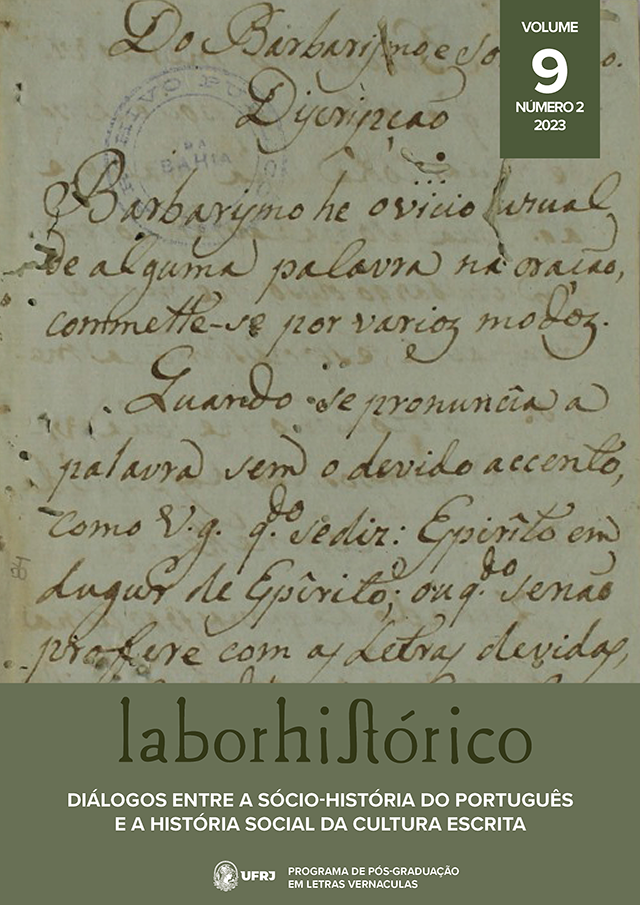ΚΑΙ ΣΥ ΤΕΚΝΟΝ. The Hellenic Correspondence of Brutvs, Assassin of Caesar: First Translation into Portuguese; Reflections; Bibliography
DOI:
https://doi.org/10.24206/lh.v9i2.60407Keywords:
Bruto, pseudepistolografia, Poder Romano, alianças políticas.Abstract
The purpose of ascribing the authenticity of the 70 epistles imputed to the Roman Marcus Junius Brutus remains an unsolved quest. The Greek letters of an institutional nature written in a style praised by many were gathered in several manuscripts. Between alleged sendings and supposed responses to orders, solicitations, threats, betrayals, advices, excuses, friendships and diplomatic hostilities, the scripts expose political choices, war strategies, resources, alliances of a complex scenario of cultures addressed by the tyrannicide. What’s more, a sententious coloring with gnomic aspects adorns the correspondences here rendered for the first time in Portuguese. It is up to the current reader to ponder beyond a supposed historicity of the writings or to integrate them totally or partially in the fictional category as rhetorical exercises of a didactic nature, perhaps even politically motivated, of uncertain date.
References
REFERÊNCIAS
ACHELIS, T. Erasmus Über Die Griechischen Briefe Des Brutus. RhM, v. 72, p. 633–638, 1917.
ADAMS, J.; JANSE, M.; SWAIN, S. Bilingualism in ancient society: language contact and the written text. Oxford: Oxford University Press, 2002.
BENTLEY, R. A Dissertation upon the Epistles of Phalaris, Themistocles, Socrates, Euripides, and the Fables of Aesop. London: J. Leake for Peter Buck, 1697.
BRANDÃO, J.; OLIVEIRA, F. de (coord.). História de Roma Antiga: volume II: Império Romano do ocidente e romanidade hispânica. Coimbra: Imprensa da Universidade de Coimbra, 2015.
CALHOUN, R. The Letter of Mithridates: A Neglected Item of Ancient Epistolary Theory. In: FREY, J. (ed.), Pseudepigraphie und Verfasserfiktion in frühchristlichen Briefen. Tübingen: Mohr Siebeck, p. 295–330, 2009.
CARVALHO, D. ERASMUS ADAGES 2OO1-3000, t. III. Paris: Belles Lettres, Le Grac J-C Saladin Editeur, 2013.
CICHORIUS, C. Die griechischen Brutusbriefe und ihre Verfasser. In: Romische Studien. Leipzig: Teubner, p. 434–438, 1922.
FILBEY, E. Concerning the Oratory of Brutus. CPh, v. 6, n. 3, p. 325–333, 1911.
GOUKOWSKY, P. Les lettres grecques de Brutus: documents authentiques ou forgeries? In: BARRANDON, N.; KIRBHILER, F. (eds.). Les gouverneurs et les provinciaux sous la République romaine. Rennes: Presses Universitaires de Rennes, p. 273–290, 2011.
HARDT, I. Catalogus Codicum Manuscriptorum Graecorum Bibliothecae Regiae Bavaricae, T. V. Monachii: Typis I. E. Seidelii Solisbacensis, 1812.
HEPDING, H. Mithridates von Pergamon. MAGS, v. 34, p. 329–340, 1909.
HØJTE, J. (ed.). Mithridates VI and the Pontic Kingdom. Aarhus: Aarhus University Press, 2009.
JONES, C. The Greek Letters Ascribed to Brutus. HSPh, v. 108, p. 195–244, 2015.
KAIMIO, J. The Romans and the Greek Language. Helsinki: Societas Scientiarum Fennica, 1979.
KIRBIHLER, F. Brutus et Cassius et les impositions, spoliations et confiscations en Asie Mineure durant les guerres civiles (44–42 a.C.). In: Ferriès, M. (ed.), Spolier et confisquer dans les mondes grec et romain. Chambéry: Université de Savoie, p. 345–346, 2013.
LENNARTZ, K.; MARTÍNEZ, J. (eds.). Tenue Est Mendacium: Rethinking Fakes and Authorship in Classical, Late Antique, & Early Christian Works. Groningen: Barkhuis, 2021.
MALHERBE, A. Ancient Epistolary Theorists. Atlanta: Scholars Press, 1988.
MARQUIS, É. La Lettre de Mithridate et les Lettres de Brutus: comment lire la fiction épistolaire? In: Cariou, M.; Marquis, É. Ἀντιγράψαι τῇ γραφῇ. Mélanges de littérature antique en l’honneur d’Alain Billault, CEROR: Lyon, p. 201-217, 2020.
MARTÍNEZ, J. Pseudepigraphy. In: McGill, S.; Watts, E. (eds.), A Companion to Late Antique Literature. Oxford: Wiley Blackwell, p. 401–415, 2018.
MOLES, J. Plutarch, Brutus and Brutus’ Greek and Latin Letters. In. Mossman, J. (ed.). Plutarch and his Intellectual World. London: Duckworth, pp. 141–168, 1997.
RAWSON, E. Cassius and Brutus: The Memory of the Liberators. In: MOXON, I.; SMART, J.; WOODMAN, A. (eds.), Past Perspectives: Studies in Greek and Roman Historical Writing. Cambridge: Cambridge University Press, p. 101–119, 1986.
RÜHL, F. Die Griechischen Briefe des Brutus. RhM, v. 70, p. 315–325, 1915.
SAPRYKIN, S. Mithridates of Pergamum – a Known and Unknown Ruler. Vestnik drevnei istorii, v. 79, n. 2, p. 280-306, 2019.
SMITH, R. The Greek Letters of M. Junius Brutus. CQ, v. 30, n. 3-4, p. 194-203, 1936.
TEMPEST, K. Brutus: The Noble Conspirator. New Haven: Yale University Press, 2017.
TORRACA, L. (ed.). Epistole greche. Naples: Libreria Scientifica Editrice, 1959.
WESTERMANN, A. De Epistolarum Scriptoribus Graecis. Commentationis. Pt. IV. Lipsiae: Litteris Staritzii, Typogr. Universit., 1851.
Downloads
Published
Issue
Section
License
Authors who publish with this journal agree to the following:
a. The authors hold copyright of the published papers; authors are the sole responsible party for published papers content; the published paper is licensed under a Creative Commons Attribution-NonCommercial 4.0 International License which allows the sharing of the publication as long as there is acknowledgement of authorship and publishing by Revista LaborHistórico.
b. Authors should seek previous permission from the journal in order to publish their articles as book chapters. Such publications should acknowledge first publishing by LaborHistórico.
c. Authors may publish and distribute their papers (for example, at institutional repositories, author's sites) at any time during or after the editorial process by Revista LaborHistórico.


